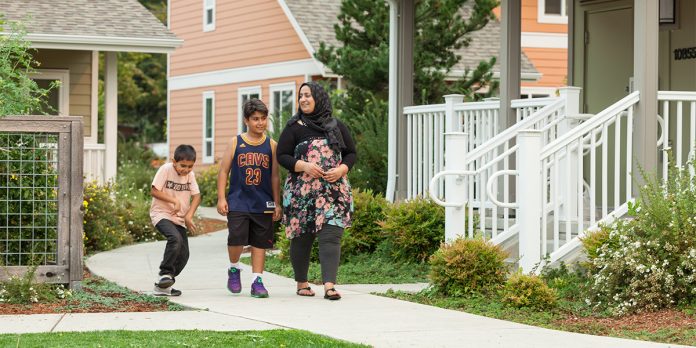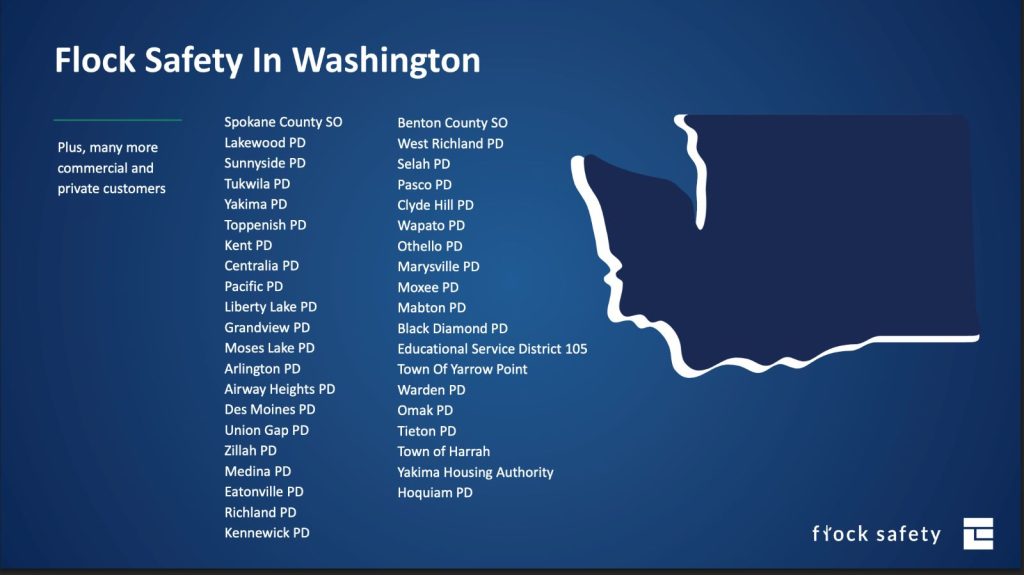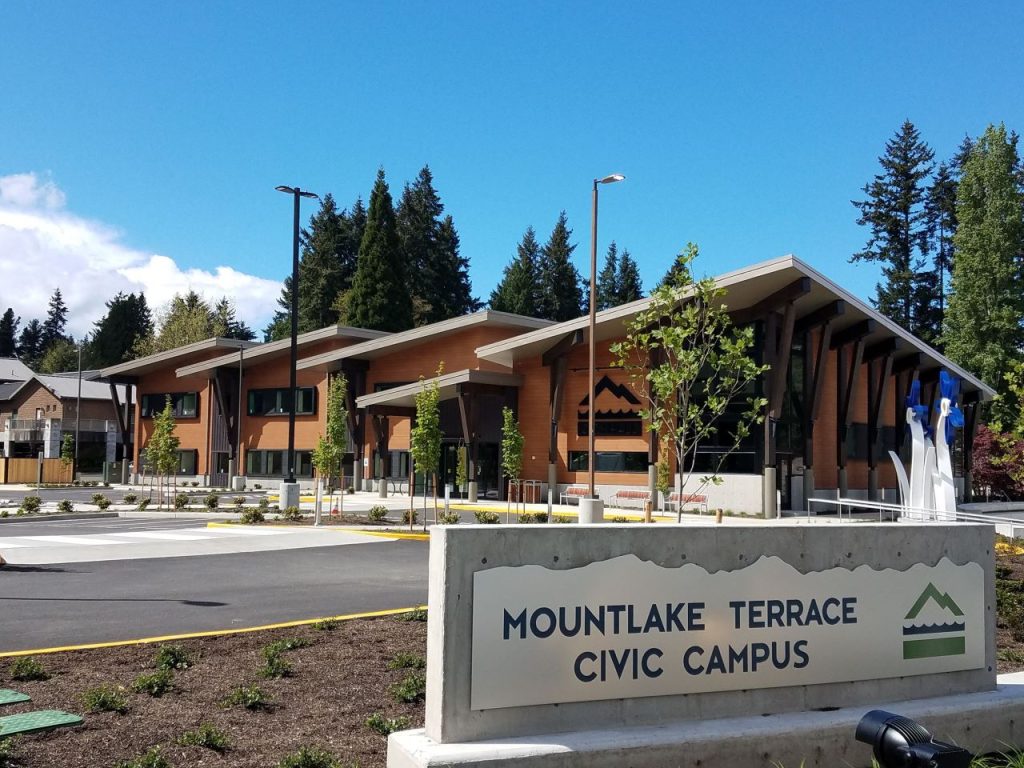
The proliferation of automatic license plate readers (ALPRs) administered by Atlanta-based security tech company Flock Safety is threatening Washington’s status as a sanctuary state. Civil rights advocates contend the surveillance tech is preventing Washington from acting as a safe haven for abortion seekers, immigrants, and refugees.
Consisting of cameras that can either be affixed in stationary locations or in vehicles such as police patrol cars, ALPRs record the license plate numbers, color, and brand of vehicles within their view range. The retention period for this data can be set by each individual agency, although the standard recommendation by Flock Safety is 30 days.
In recent weeks, 404 Media found that data collected by these Flock ALPRs has been shared with U.S. Immigration and Customs Enforcement (ICE) and the Department of Homeland Security (DHS). In May, authorities in Texas performed a nationwide search of more than 83,000 ALPR cameras for a woman who had self-administered an abortion. Almost all abortions are illegal in Texas.
New data from a public records request shared with The Urbanist shows that the King County Housing Authority (KCHA) has been among those agencies sharing Flock license plate reader data with law enforcement agencies across the country. An internal network audit that lists which agencies have searched KCHA’s data shows that it was used in the Texas authorities’ May search for the woman who had an abortion. The audit also suggests the data has been used to assist ICE and DHS.
The King County Housing Authority
The KCHA is a public housing agency that provides rental housing or rent assistance to more than 50,000 people in King County and owns more than 155 properties. The agency is funded through the rents it collects and federal investment, and it is governed by a volunteer Board of Commissioners.
In KCHA’s October 2024 newsletter, it announced that it was installing Flock ALPRs at several of its housing locations: Riverton Terrace, Pacific Court, Birch Creek, Valli Kee, and Burndale Homes. In its 2024 annual report, the authority stated it had installed 13 ALPRs on these five properties.
“The license plate readers will help solve and prevent crime by alerting law enforcement if stolen vehicles, wanted suspects, or vehicles associated with missing persons are detected,” the newsletter read.
The median KCHA household income in 2024 was $14,491. In January of 2022, the KCHA reported that 39% of its residents were Black in a county in which only 7% of the total population is Black. KCHA’s Flock cameras are surveilling some of King County’s most vulnerable communities.
Unstated by the KCHA is the possibility that the lookup data provided by their ALPRs could endanger residents or their friends and families who are trying to avoid immigration enforcement or who have had an abortion. Abortion is now illegal in almost half of U.S. states.
Meanwhile, immigrants and their allies are in increasing danger across the country. Last week. The Handbasket reported that all ICE employees received an email making clear that “agents are no longer constrained by the need to justify their warrantless arrests.” President Donald Trump announced an ICE special response team would be operating in Seattle. And on Saturday, two immigrants who were not undocumented were detained at a DHS building in Tukwila.
ICE’s actions continued to escalate on Tuesday, when New York City Comptroller (and current mayoral candidate) Brad Lander was forcibly detained at immigration court by masked federal agents, including ICE agents. Lander had been protesting the detainment of an immigrant who had just had their case dismissed, demanding agents show a warrant and a badge, when the agents decided to detain him as well.
The Washington State Attorney General’s Office (AGO) told The Urbanist that local housing agencies are not covered by the Keep Washington Working Act.
“However, public housing agencies are covered by other state laws that would prohibit practices that target or impact individuals based on protected characteristics like race, national origin, and immigration or citizenship status,” said AGO Communications Specialist Josh Manning.
In 2020, the state legislature expanded the Washington Law Against Discrimination to cover discrimination on the basis of citizenship or immigration status.
As first reported in The Burner, the abortion search calls into question Washington’s 2023 “shield law” aimed at protecting people traveling to Washington from other states to obtain reproductive and gender-affirming care.
The KCHA hadn’t responded to The Urbanist’s request for comment at the time of publication.
What shows up in KCHA’s audits
Law enforcement agencies across the country performed thousands of searches of the KCHA’s ALPR data between February 1 and June 6 of this year.
The Flock Safety ALPR data available via the audit function has a required “reason” field.
The Johnson County, Texas Sheriff’s Office accessed the KCHA’s license plate data on May 9, with the recorded reason being “had an abortion, search for female.”
While there were hundreds of searches with the reason “ICE” recorded, many records were more specific. Some of the recorded reasons related to immigration enforcement include “ICE ERO” (enforcement removal operations) three times; “ICE Fugitive” or “ICE FUGOPS” 21 times; “ICE op” or “ICE operation” 27 times; “ICE pick up” 42 times; “ICE+ERO” 14 times; “illegal immigration” four times, and “immigration+” 17 times.
In addition, 128 searches involved reasons involving one of the following phrases: “immigration,” “immigration warrant,” “immigration violations,” “immigration status,” “immigration overstay,” “immigration investigation,” and “immigration enforcement.”
Other reasons listed in the audit included “immigration drugs,” “USBP” (United States Border Patrol), “USBP immigration investigation,” and “CIC” (US Army Counterintelligence Corps).
There were also at least 1,279 searches with reasons involving “Homeland Security” or “HSI.” However, HSI has a criminal investigation mandate beyond immigration enforcement.
This news comes hard on the heels of CalMatters reporting that law enforcement agencies across southern California violated state law more than a thousand times by sharing ALPR information with federal agents. A state law prohibiting law enforcement agencies from sharing such information with out-of-state public entities and federal entities passed 10 years ago.
Police searching the above Riverside data often used the reason “HSI” when logging their searches.
Recent ALPR expansion in Washington state cities
In the last three years, Flock Safety has been expanding its network of automatic license plate readers (ALPRs) in cities across Washington State. At a recent Mountlake Terrace meeting discussing the possible acquisition of the technology, Councilmember Rick Ryan said that Washington has 80 cities, six counties, and three tribes currently using Flock ALPRs.
Washington municipalities that now have Flock ALPRs include Edmonds, Lynnwood, Monroe, Mill Creek, Everett, Arlington, Redmond, Mount Vernon, Sedro Wooley, Normandy Park, Puyallup, Kent, Olympia, Auburn, Anacortes, Des Moines, the Federal Way HOA, Medina, Sumner, Bonney Lake, Renton, and Tukwila, among many others.

The King County Sheriff’s Office (KCSO) doesn’t use Flock ALPRs in unincorporated areas of the county, but three of their contract cities – SeaTac, Covington, and Newcastle – use them.
Both Seattle and Tacoma use ALPRs from Flock’s main competitor, Axon — the security giant known for its controversial taser technology. Privacy advocates have highlighted similar data privacy concerns around the use of Axon’s technology.
“The increasing use of automated license plate readers (ALPRs) by cities poses serious threats to people’s privacy and civil liberties. ALPRs collect vast amounts of data, allowing law enforcement agencies to track and make inferences about people’s activities, associations, and behaviors,” said Tee Sannon, the ACLU of Washington’s Technology Policy Program Director. “When cities contract with private surveillance vendors like Flock Safety, they’re not just installing cameras — they’re contributing to a nationwide surveillance network.”
Flock Safety says it serves more than 5,000 cities spread across at least 45 states.
In 2022, the University of Washington’s Center for Human Rights published an article warning of the threat posed by ALPR systems to immigrant and reproductive rights in Washington and reporting that many Washington law enforcement agencies using ALPR technology had a low hit rate on wanted vehicles. The article reported on the increasing trend of Washington state agencies adopting the technology, saying that Flock salesperson Mack Larkin “cited the connection of Washington’s Flock customers to some 1,800 law enforcement agencies nationwide as a selling point.”
Similarly, in an op-ed in The Chicago Tribune last year, Ed Vogel said that access to a massive trove of nationwide data is core to the sales pitch for license plate reader companies: “Once collected, all of this [ALPR] data is shared widely with few restrictions. This is part of the marketing pitch from the companies and the appeal to police. The vast data-sharing infrastructure allows police to search plate numbers and identify where the car has been.”
Indeed, the Electronic Frontier Foundation wrote that ALPR data “can paint an intimate portrait of a driver’s life and even chill First Amendment protected activity.”
“Flock collects and stores license plate data from jurisdictions across the country, creating a centralized database that federal and state law enforcement agencies can tap into — regardless of where the data was collected,” Sannon said. “This risks undermining state-level protections like Washington’s Keep Washington Working Act, which limits local cooperation with federal immigration enforcement. Out-of-state agencies may also be able to circumvent these legal protections by directly approaching the third-party vendor. This raises serious risks for immigrants, as well as people seeking reproductive or gender-affirming care, who could be tracked and targeted across state lines.”
The audit data from the KCHA appears to be a case in point of the vulnerabilities of Flock’s database system.
Enumclaw and Gig Habor say no, Mountlake Terrace says yes
Two Washington cities, Enumclaw and Gig Harbor, recently voted down proposals for their law enforcement agencies to contract with Flock for ALPRs. In doing so, Gig Harbor gave up a $33,000 grant from the Washington Auto Theft Prevention Authority.
But at the beginning of June, Mountlake Terrace’s city council voted in favor of the license plate readers.
Arguments in favor of the ALPRs sounded much the same in all three cities. Proponents touted its help solving crimes, the fact that many of their neighboring cities already had ALPRs, and worry that not jumping on the bandwagon of heavier surveillance would draw more crime to their specific neighborhoods.
“I am in support of the cameras, I will tell you right now, because first and foremost, as a councilmember, my priority is to keep our communities safe and our well being,” said Mountlake Terrace Councilmember Laura Sonmore. “How am I going to protect each and every one of you when you leave this room? I have no other option to give you than these cameras. […] I believe that we need to at least have another tool in our toolbox to help our police catch people.”

Opponents spoke of privacy and civil rights concerns, including potential misuse of data.
“I think we’ve heard a lot of concerns from our community in a lot of spaces, but particularly concerns about things that are happening at a federal level, and the potential for data collected here in Mountlake Terrace to be misused,” said Mountlake Terrace Councilmember Erin Murray.
The conversation at the Mountlake Terrace city council meeting took place after the recent investigative reporting from 404 Media. When asked about it, Mountlake Police Department Commander Scott King portrayed Washington’s Flock data as insulated from ICE searches.
“There were agencies around the country who do work with ICE, and they ran vehicles through the Flock system for ICE,” King said. “The reason they used in their search was ICE. We don’t do that here in Washington State.”
However, the original audit discussed in the 404 Media story was from the Danville, Illinois Police Department. Illinois has a state law banning the use of ALPR data for immigration enforcement, and yet the Danville Police Department’s data was being accessed from agencies from other states for that purpose. Some of these out-of-state agencies told 404 Media their searches on behalf of federal agencies were “informal” or regarding a specific investigation.
“We have had significant pushback from our community — significant,” said Murray. “Honestly, the amount of pushback we’ve had tonight probably is more than the entire public comment I’ve received in five and a half years on the council. That says something.”
Still, the Mountlake Terrace city council chose to obtain Flock ALPRs in a five-to-two vote, bringing the number of Washington State cities using this technology to 81.
Amy Sundberg is the publisher of Notes from the Emerald City, a weekly newsletter on Seattle politics and policy with a particular focus on public safety, police accountability, and the criminal legal system. She also writes science fiction, fantasy, and horror novels. She is particularly fond of Seattle’s parks, where she can often be found walking her little dog.

